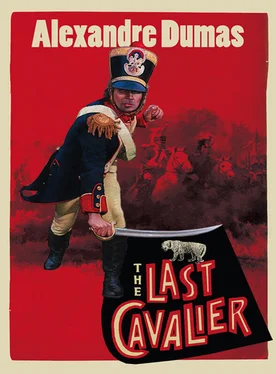Cadoudal’s one hundred men had disbanded; his army had become snipers, with fifty men splayed on each side of the Republican ranks. General Harty ordered an about-face to the right and to the left, and then his command rang out:
“Fire!”
But to no success. For the Republicans were firing at individual men, while the Chouans were shooting at a mass of soldiers in formation. Their shots almost always reached their mark.
Roland saw the disadvantages of the Republican position. He looked around, and in the middle of the smoke he descried Cadoudal standing immobile like an equestrian statue: The Royalist leader was waiting for him. With a cry, Roland rode straight for him.
As for Cadoudal, he galloped toward the brave Republican but stopped fifty paces away from him.
“Get ready,” Cadoudal said to Branche-d’Or and his men.
“Rest easy, General. We’re ready,” Branche-d’Or replied.
Cadoudal drew a pistol from the saddle holster and loaded it. Roland, his saber in hand and his body leaning down over his horse’s neck, was charging. He was only twenty paces away when Cadoudal slowly raised his hand and took aim at Roland. At ten paces, he fired.
Roland’s horse had a white star in the middle of its forehead. Cadoudal’s bullet struck the middle of the star. The horse, mortally wounded, rolled with its rider at Cadoudal’s feet.
Cadoudal put his spurs to his horse’s flanks, and it leaped over the fallen horse and rider. Branche-d’Or and his men were ready. Like a pack of jaguars they pounced on Roland, who lay trapped under his horse’s body.
The young man dropped his saber and reached for his pistols. But before he could put hand to holster, two men had seized each of his arms, while the other six dragged the horse off his legs. They worked with such coordination that it was apparent a plan had been laid in advance.
Roland roared in anger. Branche-d’Or handed him his hat.
“I will not surrender,” Roland shouted.
“There’s no reason you need to surrender, Monsieur de Montrevel,” Branche-d’Or answered politely.
“And why not?” asked Roland, wasting his efforts in a desperate, useless struggle.
“Because you have been captured, monsieur.”
The obvious truth precluded any reasonable response Roland might make. “Then kill me,” he shouted.
“We have no intention of killing you, monsieur.”
“Then what do you want?”
“Your word that you will take no further part in this combat. At that price, we’ll set you free.”
“Never!” cried Roland.
“Excuse me, Monsieur de Montrevel. What you are doing is not very loyal,” Branche-d’Or responded.
“Not loyal! Ah, you wretch! You are insulting me because you know that I can neither defend myself nor punish you.”
“I am not a wretch, and I am not insulting you, Monsieur de Montrevel. All I’m saying is that by not giving your word and by forcing us to guard you, you are depriving the general of nine men who could be of use to him. That is not the way the great Tête-Ronde treated you. He had two hundred men more than you, and he sent them away. Now we are only ninety-one against your one hundred.”
A flame flashed through Roland’s eyes, then suddenly he went pale. “You are right, Branche-d’Or,” he said. “Whether or not I can expect help, I surrender. You may go fight with your companions.”
Shouting for joy, the Chouans released Roland. Then, waving their hats and guns and crying “Long live the king!” they rushed into the melee.
ROLAND STOOD ALONE for a moment. He was now free, but he had been disarmed literally by his fall and figuratively by his word. He contemplated the little mound where he and Cadoudal had shared a breakfast; it was still covered with the cloak that had served as a tablecloth. From there he could survey the whole battlefield, and if his eyes had not been clouded by tears of shame, he would not have missed the slightest detail.
Like the demon of war, invulnerable and relentless, Cadoudal was standing upright on his horse in the midst of the fire and smoke.
As the heat of his anger dried his tears of shame, Roland noticed more. Out in the fields where green wheat was beginning to sprout, he counted the bodies of a dozen Chouans who lay scattered here and there on the ground. But the Republicans, in their compact formation on the road, had lost more than twice that number.
The wounded on both sides dragged themselves into the open field, where, like broken serpents, they tried to rise and continue fighting, the Republicans with their bayonets, the Chouans with their knives. Or they would reload their guns, then manage to get up on one knee, and fire, and fall back again onto the ground.
On both sides the combat was relentless, unceasing, pitiless. Civil war, a merciless and unforgiving civil war, was translating its hate into blood and death across the battlefield.
Cadoudal rode back and forth through the human redoubt. From twenty paces he’d fire, sometimes with his pistols, sometimes from a double-barreled gun that he’d then toss to a Chouan for reloading. Every time he shot, a man would fall. General Harty honored Cadoudal’s maneuvers by ordering an entire platoon to fire at him.
In a wall of flame and smoke, he disappeared. They saw him fall, him and his horse, as if struck by lightning.
Ten or twelve men rushed out of the Republican ranks, but they were met by an equal number of Chouans. In the terrible hand-to-hand combat, the Chouans with their knives seemed to have the upper hand.
Then, suddenly, Cadoudal was again among them; standing in his stirrups, he wielded a pistol in each hand. Two men fell, two men died.
Thirty Chouans joined him to form a sort of wedge. Now wielding a regular-issue rifle, using it as a club, Cadoudal led his thirty men into their enemy’s ranks. With each swing the giant felled a man. He broke through the Blues’ battalion, and Roland saw him appear on the Republican side of the battle lines. Then, like a wild boar that turns back on a fallen hunter to rip out his entrails, Cadoudal reentered the fray and widened the breach.
General Harty rallied twenty men around him. Holding their bayonets in front of them, they bore down on the Chouans who had formed a circle around their general. Harty’s horse had been disemboweled, so with his clothing full of bullet holes and blood flowing from two wounds, he marched on foot with his twenty men. Ten of them fell before they could break the Chouan circle, but Harty made it through to the other side.
Ready though the Chouans were to pursue him, Cadoudal in a thunderous voice called out: “You should not have let him pass, but since he’s already through, let him withdraw freely.” The Chouans obeyed their leader as if his words were sacred.
“And now,” Cadoudal cried, “let the firing cease! No more killing! Only prisoners!”
And with that, everything was over.
In that horrible war both sides shot their prisoners: the Blues because they considered the Chouans and the Vendeans to be brigands; the Whites because they didn’t know what to do with the Republicans they captured.
The Republicans tossed aside their guns to avoid handing them over to their enemy. When the Chouans approached them, they opened their cartridge pouches to show that they had spent their last ammunition.
Cadoudal started his march over to Roland.
During the final stages of the battle, the young man had remained seated; with his eyes fixed on the struggle, his hair wet with sweat, his breathing pained and heavy, he had waited. When he saw that fortune had turned against the Republicans and him, he had put his hands to his head and dropped facedown to the ground.
Читать дальше












